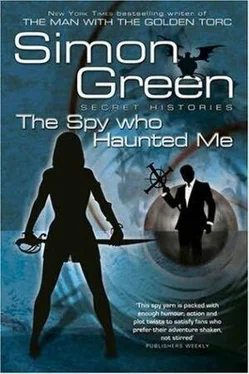The lobby was a mess, with overturned furniture and scattered papers everywhere, none of them in any condition to be deciphered. There were no signs on the wall, no arrows pointing out various departments. Again, either you worked here and knew where your place was, or it was none of your business. The first surprise was that the building’s heating system was working, and the place was warm enough for us to undo our coats. The second surprise came when the lights snapped on without anyone even touching a switch. The lobby immediately looked a lot less gloomy and threatening.
“First time I’ve felt human since I arrived in this godforsaken wilderness,” said Peter. “This ugly pile must have its own generators in the basement. Though I’m surprised the activation sensors are still working after all these years.”
“Russians built things to last,” Walker murmured, peering about him in an absentminded sort of way. “I wonder what else has survived here . . .”
I armoured up and looked around through my golden mask. The others backed away a little.
“Eddie?” Honey said carefully. “What are you doing?”
“Checking for things that might have survived,” I said. “Radiation, hot spots, chemical or bacterial spills . . . But I don’t see anything. Until I use my Sight, and then . . . The whole building’s a repository of past events: ghosts and echoes and memories. Just memories, though; no living presence I can detect. Just a lot of bad feelings. Pain and horror and death. And something very like despair.”
I armoured down. The others made a point of being very interested in something else to show they weren’t impressed by my transformation anymore.
“The generators worry me,” Honey said abruptly. “They shouldn’t still be working after being down for so many years. Soviet technology, for the most part, was never that efficient or reliable. If the city’s designers spent serious money on top-of-the-line machinery . . . what the scientists were doing here must have been really important.”
“The psychic energy source is very definitely upstairs,” I said. “It’s so strong it’s blasting out through the roof. So let’s pop upstairs, people, and see if we can scare up a few ghosts.”
“I never know when he’s joking,” said Peter.
We found the laboratory on the top floor easily enough by following the heaviest electrical cables along the walls. Extra cables had clearly been added later, and somewhat clumsily too, as though the work had been done in a hurry. The whole place seemed strangely clean. No dust, no cobwebs, nothing to mark the passing of so many years’ neglect.
The laboratory itself turned out to be just a great open room cut in two by a huge one-way mirror so someone could observe the scientists. Without being seen themselves. And there you had Soviet Cold War thinking in a nutshell. They even spied on each other. We stayed in the observation room, looking through the one-way glass. I had a really bad feeling about the other room, and others were so jittery by now, they were quite happy to accept that.
The laboratory was packed with bulky, old-fashioned computer equipment, powerful enough in a brutal sort of way. Old and new models were crowded together and sometimes even connected to each other. A single skylight let in a dim glow from outside. And directly under this natural spotlight was set something very like a dentist’s chair: all cold steel and black leather, complete with heavy arm and leg restraints. The chair was bolted to the floor. It didn’t look like the kind of chair anyone would sit down in by choice.
The room we were in was mostly full of recording equipment. Old-fashioned reel-to-reel tape recorders, bulky videotape recorders, and a single large television set to play them back on. It all looked very neat and organised, as though nothing had been disturbed for years. And again, not a speck of dust anywhere. Someone, or something, was preserving this room just as it had been, before . . . whatever had happened here, happened. Honey bent over a pile of videotapes, her lips moving slowly as she worked her way through the handwritten Cyrillic labels.
“Anything?” I said, trying hard to sound calm and casual.
“Mostly just dates and names. Nothing to indicate what they were up to.”
“That chair does not inspire confidence,” said Peter. “What did they do in that room . . . that they needed bulletproof one-way glass to protect the observers from what they were observing?”
We all looked at him. “How did you know that was bulletproof glass, Peter?” said Walker.
“I just . . . felt it,” Peter said, frowning. “Ever since I came in here, it’s been like . . . remembering someone else’s memories. Creepy . . .”
In the end, we just took a video from the pile at random and stuck it in the nearest machine. The old television set took a while to warm up, and when the picture finally arrived it was only black-and-white. The recording showed exactly what the scientists had been doing in the other room. Experimenting on unwilling human subjects, and testing them to destruction. We watched as the subjects yelled and screamed and shouted obscenities, straining desperately against the heavy restraining straps while blank-faced men and women in grubby lab coats stuck them with needles, or exposed them to radiation, or just cut them open, to see what was happening inside.
It was bad enough in black-and-white. In colour, it would have been unbearable.
We ran quickly through the tapes, just checking a few minutes from each. A few minutes was all we could stand. They were all pretty much the same. Cold-blooded glimpses of Hell.
One man’s head exploded, quite suddenly, blood and brains showering wetly over the attending scientists. Another man melted right out of the chair, his body losing all shape and cohesion, his flesh running through the restraining straps like thick pink mud. He screamed as long as he could, until his vocal cords fell apart and his jaw dropped away from his face. He ended up a pink frothing mess on the floor. One of the scientists stepped in it by accident, had hysterics, and had to be led away.
A middle-aged woman sat on the floor, wearing nothing but a stained oversized nappy. She had a huge bulging forehead held together with heavy black stitches and crude metal staples. She was assembling a strange machine, whose shape and function made no sense at all. When the scientists expressed displeasure at what she’d built and gestured at the chair, the woman calmly picked up a sharp piece of metal and stuck it repeatedly into her left eye, until she died.
And one man, with a Y-shaped autopsy scar still vivid on his chest and rows of steel nozzles protruding from his abdomen from implanted technology, burst all the straps holding him to the chair and killed three scientists and seven of the soldiers sent in to restrain him before one of them got close enough to shoot him repeatedly in the head.
We watched as much of it as we could stand, and then I told Honey to check the dates and find us the tape from the last experiment. The very last thing the scientists were working on before it all went wrong.
“Whatever happened here,” said Walker, “they deserved it. This isn’t a scientific laboratory; it’s a torture chamber.”
“What did they think they were doing?” said Peter. “What were they trying to achieve?”
“I think they were all quite mad,” said Honey. “If they weren’t when they started out, what they did here drove them mad.”
“No,” I said. “I don’t think they had that excuse. I think . . . they just did what they were told. Perhaps because if they didn’t, they’d end up in the chair themselves.”
“We should burn this city to the ground,” said Walker. “And seed the earth with salt.”
Читать дальше












